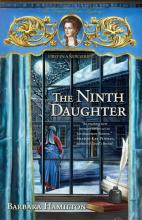inspiration + perspiration = invention :: T. Edison ::

I love mysteries. I love reading about history. So it should come as no surprise that I adore historical mysteries, especially ones that fully immerse themselves in the time period. Barbara Hamilton's novel The Ninth Daughter is a great addition to this subgenre, with the introduction of a series based around one of our most famous Founding Mothers: Abigail Adams.
The story is set three years prior to that fateful July in 1776: the Sons of Liberty have just begun making noise against the British government, but the country as a whole isn't ready for war just yet. Good patriot wife that she is, Abigail Adams has other concerns besides the price of tea: she finds a corpse in the home of a friend who's nowhere to be found. Is she a fled culprit, or a victim herself?
Hamilton has certainly done her homework: 18th century Boston came alive on the pages of this book in all manner of details usually glossed over in historical potboilers. Abigail walks most of the book, and nearly always with a male escort. She performs labor-intensive chores. It's hard to see at night despite having a lantern. The countryside is sparsely populated with few luxuries.
But don't think this author just regurgitated research on the page. The narrative really gets a lift through its great characterization. Abigail is a reluctant sleuth, and while unwavering in her support of the patriot cause, she's less happy with how many use it as an excuse to forget their fellow Daughter of Liberty. Her loyalty to her friend and dedication to the truth force her to grapple with the ever-changing loyalties of this world. Obvious antagonists (the overbearing estranged husband, the aristocratic British officer) turn out to be more complex individuals. Unexpected allies and even closer enemies abound.
Personally I was impressed by how Hamilton depicted religion. God, church, and theology all play a very real part in these people's lives, guiding and dividing people as much as the question of liberty. Abigail continually grapples with how to do right when the path is not clear, especially as many on both sides of the conflict seek to redefine it. There's little to no sacred/secular divide. It's an alien world for many people to imagine, perhaps more so than the muddy streets or horse-drawn wagons.
A few times the narrative repeated details that I thought were already established, and some people might be put off by the style of narrative (it's not nearly as driven as most mysteries). Readers should note that some coarser characters use strong language (of the restricted-on-television variety): rarely, but present enough to be jarring. While I did see the actual culprit a few steps ahead of the story, it didn't cheapen the ride, mainly due to how much more this novel stands as a grand story than a mere whodunit.
I found Hamilton's plucky tale a great take on a historical figure so often seen through the lens of her more famous male contemporaries. It was great to see John Adams play second fiddle to his dear friend for once.





